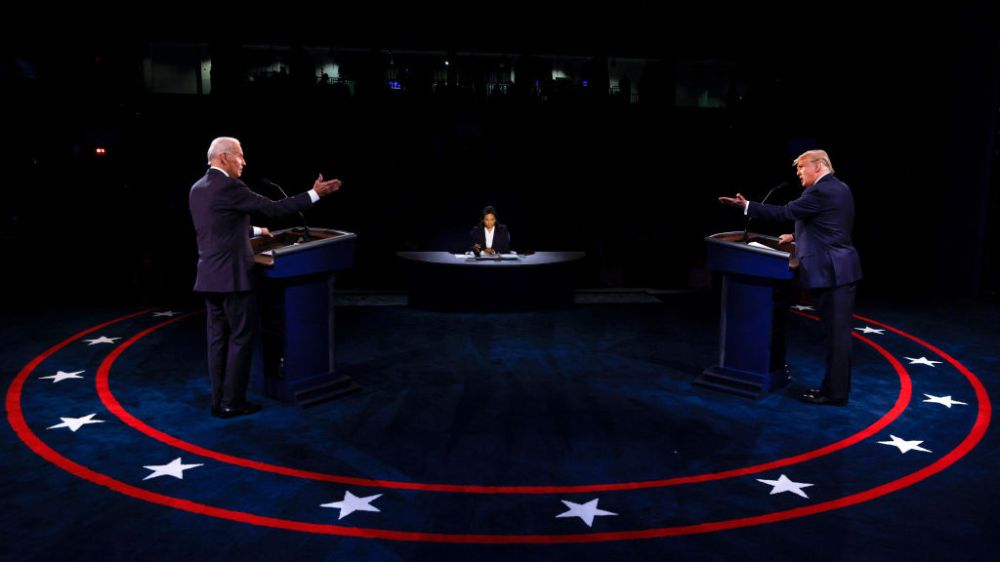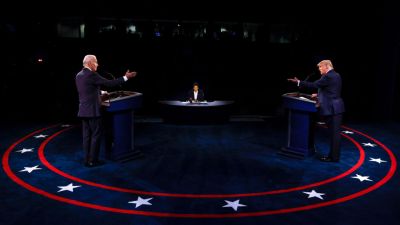Not for another seven and a half months will there be truly meaningful news at the polls to analyze, but I suppose Tuesday night’s primary results warrant a word or two.
So here’s a word or two: We remain, as a people, trapped in the darkest timeline.
By choice, of course. Most Americans oppose having Joe Biden or Donald Trump back on the ballot in November, but partisans are comfortable with it. And in our terrible system of choosing party nominees via primaries, partisans call the tune.
Democratic primary voters weren’t offered a serious alternative to the president this year and never put pressure on their leadership to provide one. Republican primary voters were offered serious alternatives to their own nominee but preferred to stick with an adjudicated rapist who attempted a coup on January 6.
The fact that we’ve saddled ourselves with a rematch between two unfit geriatrics whom most of the population dislikes is a window onto a decadent country’s depleted civilizational will. A people that no longer takes politics or its role in the world seriously predictably can’t muster the effort to provide itself with capable leadership options for its most important job. No wonder Aaron Rodgers is suddenly being touted as a potential vice presidential candidate; in 2024 America, why wouldn’t he be?
Decline is a choice, as the latest Dispatch editorial recently reminded us. On Tuesday night, Americans chose decline. Again.
And if the last several months of general election polling are any indicator, they’re prepared to wrap their arms around it in a passionate embrace in November.
The standard way Trump’s critics cope with his persistent head-to-head lead against the president is by reminding themselves that it’s still early. Which is true, sort of: The upcoming 2024 Major League Baseball season will begin and end before Americans elect their next president, Nate Silver noted recently.
But even so, he’s alarmed by how sanguine Democrats have become about the grave electoral problem Biden is facing. And he should be.
With one exception, there’s been precious little movement in national polling between March and November of an election year over the last five presidential cycles. The exception was 2008, when the financial crisis that fall crushed whatever chance John McCain had of overtaking Barack Obama. Barring another black-swan event like that in 2024—which would somehow need to damage the challenger, Trump, not the incumbent Biden—there’s no obvious reason to expect the president to surge 5 or 6 points in national polling and regain the barely-enough-to-win popular strength he enjoyed in 2020.
That’s an impossibly bitter pill for Trump’s critics to swallow, enough so that it’s unfair to expect them to digest it before they’re forced. So I expect they’ll spend much of the next nearly eight months futilely pining for game-changing moments that might, like a bolt from the blue, somehow upend the race in an instant and set Biden back on course to victory.
Which brings us to the State of the Union.
There are few ironclad rules of politics but here’s one: The State of the Union never matters.
Yes, it draws a dependably big audience, but that audience consists mostly of members of the president’s own party who are already committed to supporting him for reelection. And the speech is never, ever memorable. The familiar policy laundry list template guarantees it; invariably it’s forgotten the moment it ends.
This year’s address had the potential to be different because of doubts about Biden’s fitness for office. Right-wing media has convinced its consumers that the president spends most of his day in a vegetative state and the White House has fed suspicions among swing voters by declining opportunities to have him speak extemporaneously to a large viewing audience. Most Americans don’t think he’s up to the job.
To reassure them that he’s ready for four more years, the commentariat insisted, he would need to be sharp, lively, and engaged at last week’s State of the Union.
And he was. He was loud, feisty, and sufficiently energetic to have worked the room at length before and after his speech. The commentariat was impressed. The comeback had begun.
Except it had not, it turns out.
My colleague John McCormack has been tracking polling since the State of the Union for evidence of a Biden bounce and, as of Tuesday evening, had come up empty. Among the six national surveys conducted after last week’s speech, Feisty Joe still trails Trump in five. (A Daily Kos poll is the exception, where the race is within the margin of error.) Of those five, not only does he trail, he hasn’t made up ground in any of them. Trump’s lead has remained steady in polls from Forbes, YouGov, and Suffolk University and actually ticked up in polling from Yahoo News and Morning Consult.
On the day of the SOTU, he led by 1.8 points in the RealClearPolitics national average. Six days later, he leads by 2.4.
Suffolk asked respondents who watched the speech whether it made their view of Biden better or worse and found a roughly even split of 33-28. Among independents, it was 25-26. A CNN snap poll found that 65 percent who watched it had a positive reaction, which sounds promising until you learn that that was the lowest share in a quarter-century. The share who were “very” positive was 35 percent, the second-lowest in recent history—ahead of only last year’s Biden address.
The good news for Democrats in the Suffolk data is that 67 percent of their own party said their opinion of the president improved after the speech, which might mean something for left-wing turnout in the fall. The bad news is that the same poll finds Americans net positive on Donald Trump’s performance as president, 49-47. Biden’s approval is 41-55 by comparison. And among the “double haters” who dislike both candidates, a group won overwhelmingly by Biden four years ago, Trump now leads 25-18.
If, after all that, there remains any doubt that the State of the Union mattered much less than the pundit class would like to believe, FiveThirtyEight marked this grim milestone on Wednesday morning.
That’s considerably worse than Trump’s net approval at this stage in his presidency.
The State of the Union didn’t matter because it never matters. And deep down, I think the commentariat knew it wouldn’t.
Their unrealistically high expectations for Biden’s speech this year were less a function of naivete, I suspect, than of straining to cope with the momentous psychological ordeal of realizing that the greatest country in the world is preparing to elect Donald Trump president again. Americans are about to answer the question “Are you better off now than you were four years ago?” in the affirmative by reinstalling a guy who was saying and doing stuff like this exactly four years ago today:
Returning him to office after everything he’s done is unfathomable, literally. So no wonder Trump critics who can’t fathom it are turning to alternative explanations for his surprisingly durable lead in the polls.
Some have retreated into denialism, insisting that the numbers can’t be accurate. Silver recently reminisced about the “unskewed polls” phenomenon on the right in 2012, when grassroots Republicans couldn’t accept that Barack Obama was on track to win again and invented a cockamamie alternate statistical methodology to explain why he was likely to lose. This time it’s liberals who are veering into “unskewed polls” territory, Silver pointed out—including, ominously, certain well-known and influential liberals who work at the White House. “Polling is broken,” one senior Biden aide confidently assured The New Yorker recently. We’d all better hope so.
Other political commentators have eschewed outright denialism and instead speculated about a “shy anti-Trump vote” that might be hiding from pollsters, making Biden appear less competitive than he actually is.
In Republican primaries, Trump has consistently underperformed his polling, Karl Rove pointed out recently in support of the thesis. Just Tuesday night in Georgia, Trump lost more than 13 percent of the vote to a candidate who’s no longer in the race. In 2016 and 2020, polling outfits famously failed to anticipate the full extent of his support on Election Day, whether because “shy” Trump voters had been too embarrassed to admit that they were backing him or because they weren’t willing to talk to pollsters in the first place. Between the left’s unhappiness with the president lately and the right’s devolution into a Trump-worshiping cult of personality, might it be that “shy” anti-Trump voters on both sides have begun to disguise their intentions to support Joe Biden this time?
Anything’s possible. According to the Suffolk data, Biden wins a smaller share of Democrats than Trump does of Republicans, and his party is less likely to say they’re “excited” or “satisfied” to have him as their nominee than the GOP is to say so of Trump. If you want to believe that many Democrats who claim not to support the president secretly intend to bite the bullet for him in November and that many Republicans who claim they’re supporting Trump are only pretending due to fear that their neighbors might find out the truth, feel free.
But there’s no compelling reason in the numbers as yet to expect a “shy anti-Trump vote” this fall, says New York Times election analyst Nate Cohn, who’s cautiously skeptical of the theory. And Nikki Haley’s surprisingly strong protest-vote showing in Georgia on Tuesday turns out to be less surprising than it might seem. Overwhelmingly, the votes she received were cast early, likely before she left the race. She received just 5 percent of the Election Day vote.
To those wishing upon a star that there’s a “shy anti-Trump vote” deus ex machina poised to rescue America this fall, I would say this: What makes you so sure there isn’t still a “shy pro-Trump vote” lurking within the electorate that will emerge and propel him to an even more resounding victory than the current polling indicates?
Trump is considerably more embarrassing today than he was in 2016 and 2020 and his fans have been steadily radicalized over time against trusting any arm of the “fake news,” polling outfits included. Arguably they have more reason to be “shy” in 2024 than they did previously. And if they are, there’s a fair chance that he’ll overperform his polling again on Election Day and win going away.
No wonder nervous anti-Trumpers cling to nonsense like “the State of the Union could be a game-changer” to cope.
I fear we’re destined to experience the same cycle of unrealistically high hopes followed by disappointment for the rest of the campaign, with Trump critics lurching desperately from one phantom inflection point in the race to another as each fails to move the needle.
The next false-alarm turning point will be Trump’s criminal trial in Manhattan, assuming it isn’t delayed past the election the way his other three prosecutions are likely to be. That seems likely to be a bust: The Manhattan charges are the thinnest of the bunch and unlikely to result in prison time, and fewer than half of the respondents polled by Suffolk are even planning to follow the trial. Fewer than 10 percent of Trump’s supporters are open to switching their votes if he’s convicted and just 1 percent are willing to switch to Biden.
Once the right-wing messaging machine goes to work on them, that share will dwindle to practically nothing—especially with voters across all three partisan groups(!) now less likely to believe that Trump committed serious federal crimes than they used to be.
No worries, though. If a conviction in Manhattan doesn’t move the polls, the Democratic convention surely will. Biden will give another rousing speech and, perhaps, receive a surprise endorsement or two from prominent Republicans warning sternly of the threat from a second Trump term. Liz Cheney, Chris Christie, Nikki Haley—there’s no shortage of conservatives who might conceivably step up and lend bipartisan credibility to the president’s campaign.
As much as I’d like to see that, though, I’m skeptical it would matter much. Rarely if ever has America had a presidential election in which both candidates are known quantities to the degree that Trump and Biden are. Haley can theoretically offer “permission” to disaffected conservatives to vote Democratic this time but her case will be based on a bill of particulars against Trump that’s familiar to those voters and presumably already priced into the polling. That’s Biden’s problem in a nutshell: Gaining 5 or 6 points in national surveys is theoretically doable but immensely difficult when the electorate already has very firm, very well-informed opinions about the two party nominees.
The “vibe” from the polls for the past six months has been that the country has given up on its president as being unfit for a second term and will reelect him only by happenstance, if the third-party vote somehow ends up hurting Trump more than Biden. I find it impossible to believe that a successful convention will alter that dynamic fundamentally.
The only event on the calendar with true game-changing potential, I think, is a series of presidential debates.
Trump critics will despise that idea, partly because of the enormous risk it presents of a catastrophic Biden “senior moment” in real time and partly because of Trump’s loathsome hypocrisy in ducking GOP primary debates while demanding face time with the president. But I don’t know what the alternative is. Assuming the public is still open to being persuaded that Biden can serve four more years capably—which I’m not sure we should assume—the only way he’ll convince them is by showing them that he can still think and speak effectively on his feet, without a teleprompter.
I think it’s possible that Trump will alienate so many undecided “double haters” between now and the fall with his antics that those voters will tune into the debates essentially looking for a reason to talk themselves into backing Biden. A serviceable performance by the president could be the excuse they need.
But even that wouldn’t be a true game-changer, just a slight twitch of the “I can’t believe we’re going to reelect this guy” needle of horror from one candidate to the other. Despite the wishful thinking of liberal Trump critics, the cause of Biden’s weak numbers isn’t media bias or a “skewed” polling methodology that oversamples Republicans or profound voter ignorance about the state of the economy. (The share of Americans who believe an economic recovery is under way is actually now at its highest point since August 2021.) The causes are durably high inflation, a multiracial working-class political realignment that’s still in motion, the president’s advanced age, and—gulp—public nostalgia for the Trump years, at least before he began tweeting about the low, low COVID body count in the U.S. achieved by his amazing immigration policies.
Barring a Trump health event, a Biden win won’t be the product of any game-changer. It’ll be a slow grind over many months toward a slight advantage in the polls that allows him to eke out wins in swing states by the skin of his teeth, almost certainly en route to securing fewer electoral votes than he won in 2020. It might even require an inadvertent assist from Robert F. Kennedy Jr. by unintentionally yet efficiently diminishing Trump’s share of the populist vote in key battlegrounds. A second Biden term will be a plurality proposition, more an accident than a purposeful, considered choice. Even so: I’ll take it.







Please note that we at The Dispatch hold ourselves, our work, and our commenters to a higher standard than other places on the internet. We welcome comments that foster genuine debate or discussion—including comments critical of us or our work—but responses that include ad hominem attacks on fellow Dispatch members or are intended to stoke fear and anger may be moderated.
With your membership, you only have the ability to comment on The Morning Dispatch articles. Consider upgrading to join the conversation everywhere.